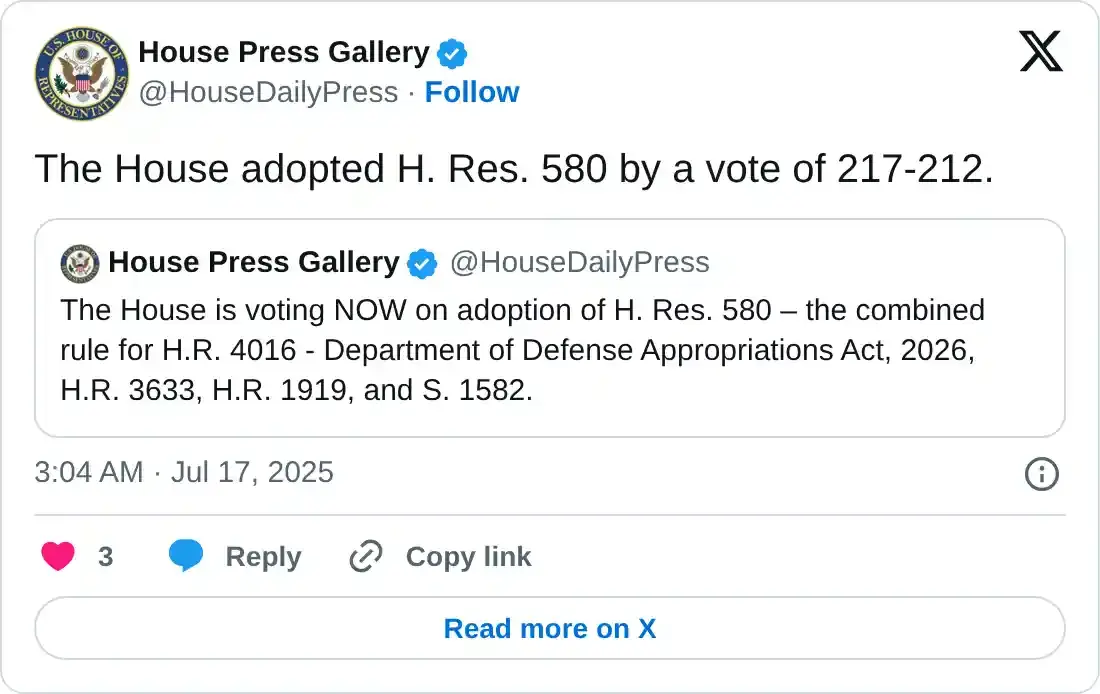Crypto Week survives scare as House members scramble to advance procedural motion in a 217–212 vote
- House lawmakers passed a procedural motion to move several crypto bills to the floor for deliberation after hours of debate.
- The development follows a dispute among Republican lawmakers over the merging of the CLARITY and Anti-CBDC Surveillance bills.
- The GENIUS and CLARITY bills could receive a floor vote on Thursday after the Anti-CBDC bill was attached to the NDAA Act.
House Republicans scrambled to win over holdouts on Wednesday to pass a procedural motion for several crypto bills by a vote of 217–212. The longest House vote in history, which lasted nearly ten hours, will see the GENIUS and CLARITY bills head to the floor for final passage deliberations on Thursday.
House lawmakers pass procedural motion to keep Crypto Week hopes alive
The House Crypto Week faced a crucial test again on Wednesday after lawmakers scrambled to pass a procedural motion that would allow the GENIUS, CLARITY, and Anti-CBDC Surveillance bills to move forward. After lingering for nearly 10 hours, in what became the longest vote in the House, the procedural motion passed by a vote of 217–212, marking success in Republican efforts to bring the bills to the floor for final passage.

The success came after most Republicans reversed their previous stance from a "no" to a "yes" within a few hours.
The development shook crypto community members, who had anticipated swift engagement from lawmakers after Tuesday's failed effort.
Through an initial 215–211 vote on Wednesday, lawmakers narrowly approved reconsideration of the procedural motion for the bills, but debates in the House stalled progress on the vote.
The setback came after nine Republicans initially withheld support, pushing for the CLARITY and Anti-CBDC Surveillance State bills to be joined into one. Insiders noted that joining both bills was part of a deal between former President Trump and 12 GOP lawmakers during a meeting late Tuesday. The agreement was expected to secure their backing for the procedural vote.
"It looks like some of the 12 Republicans who voted no yesterday [Tuesday] — but flipped to yes after meeting with Trump last night — did so on the promise that strong anti-CBDC language would be added to CLARITY, since GENIUS isn't open for amendments'" wrote Crypto in America's Eleanor Terret on X.
This comes after lawmakers initially attempted to bring the three crypto bills to the House floor for final deliberation on Tuesday. The attempt failed in a 196-223 vote, with 12 Republicans voting against the motion.
GOP members who initially refused to support the motion cited concerns over a central bank digital currency (CBDC) and the lack of a combined legislative package.
However, efforts to merge the market structure bill with the Anti-CBDC legislation also faced pushback from Republicans who wrote the CLARITY Act. This group expressed that merging the bills could make it difficult for CLARITY to pass, as the inclusion of anti-CBDC language could force Democrats to withdraw their support.
"The authors and a handful of other Financial Services Committee members have made it clear they believe adding anti-CBDC provisions to CLARITY [...] could jeopardize the bipartisan market structure legislation," Terret added.
After several meetings, Rep. Tom Emmer said the Anti-CBDC bill will be added to the National Defense Authorization Act (NDAA).
"Attaching our Anti-CBDC Surveillance State Act to the NDAA will ensure unelected bureaucrats are NEVER allowed to trade Americans' financial privacy for a CCP-style surveillance tool," said Majority Whip Tom Emmer in an X post.
The GENIUS and CLARITY bills could be set for a floor vote as early as Thursday for final passage.
The GENIUS bill specifically targets the regulation of stablecoins, while the CLARITY bill, also known as the market structure bill, aims to provide clear guidance for the broader cryptocurrency market. The Anti-CBDC Surveillance State bill, on the other hand, aims to restrict the Federal Reserve (Fed) from developing, issuing, or using a Central Bank Digital Currency (CBDC) for monetary purposes.

